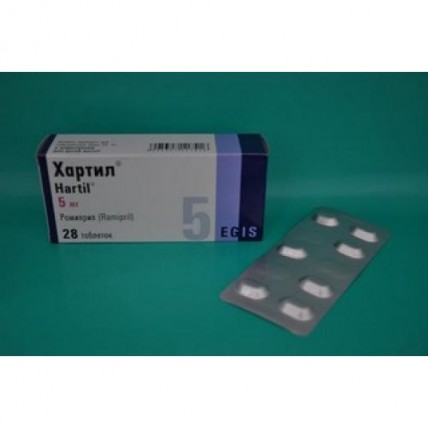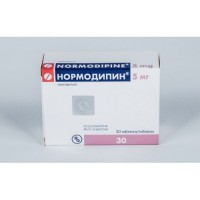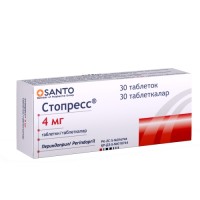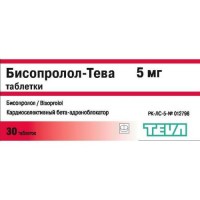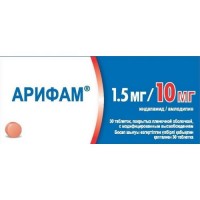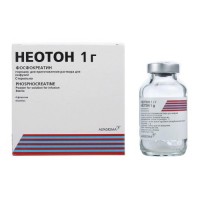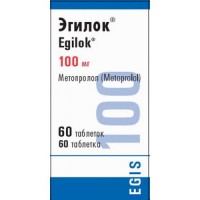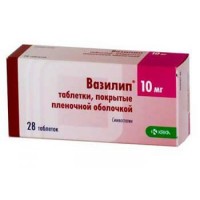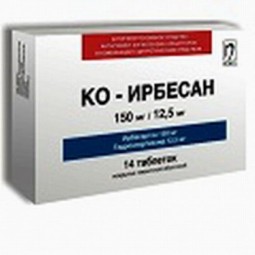Hartil® (Ramipril) 5 mg (28 tablets)
- $21.30
The instruction for medical use
of HARTIL® medicine
the Trade name
Hartil ®
the International unlicensed
name Ramipril Lekarstvennaya a form
of the Tablet of 2.5 mg, 5 mg, 10 mg
Structure
One tablet contains
active agent - ramiprit 2.5 mg, 5 mg, 10 mg,
excipients: Natrii hydrocarbonas, lactoses monohydrate, sodium of a kroskarmelloz, starch prezhelatinizirovanny 1500, the sodium stearylfumarating
Tablets of 2.5 mg contain ferrous oxide yellow.
Tablets of 5 mg contain ferrous oxide red, ferrous oxide yellow.
Description
of the Tablet of 2.5 mg: yellow or light yellow, it is possible with a marble surface, flat oval, with a facet, with risky and an engraving of R2 on one party of a tablet, and risks on side surfaces.
Tablets of 5 mg: light pink or salmoncolored, it is possible with a marble surface flat oval, with a facet, with risky and an engraving of R3 on one party of a tablet, and risks on side surfaces.
Tablets of 10 mg: white or almost white flat oval, with a facet, with risky and an engraving of R4 on one party of a tablet, and risks on side surfaces.
Pharmacotherapeutic group
the Drugs influencing renin-angiotenzinovuyu a system. The Enzyme Angiotensin-converting (EAC) inhibitors
the Code of automatic telephone exchange C09A A05
ramiprit the Pharmacological Pharmacokinetics Later properties of intake quickly is soaked up from digestive tract. The maximum concentration of a ramipril in blood plasma is reached within 1 hour. Extent of absorption - not less than 50-60% of the entered dose. Almost it is completely metabolized (generally - in a liver) with formation of an active metabolite - the ramiprilat (inhibits AKF 6 times more actively, than ramiprit) and inactive metabolites. The maximum concentration of the ramiprilat in blood plasma is reached in 2-4 hours. Among the known inactive metabolites - diketopiperazine ether, diketopiperazine acid and also glucuronides of a ramipril and the ramiprilat. Linking with proteins of plasma for a ramipril - 73%, the ramiprilat of-56%. Steady concentration of the ramiprilat in plasma after single daily dose of a ramipril in a dose of 5 mg is reached approximately by 4th day. Elimination half-life of a ramipril – 5.1 hours, and the ramiprilat of 13-17 hours. Ramipril has a multiphase pharmacokinetic profile. After intake about 60% of a dose are removed with urine (mainly in the form of metabolites), about 40% with a stake, less than 2% are allocated with urine in not changed look. Removal of a ramipril, the ramiprilat and inactive metabolites with urine decreases in a renal failure that increases concentration of the ramiprilat. Decrease in enzymatic activity of a liver at disturbance of its function leads to delay of transformation of a ramipril in ramiprilat that can cause increase in level of a ramipril.
The antihypertensive effect begins in 1-2 hours after intake of a single dose of drug, the maximum effect develops in 3-6 hours after reception and remains within 24 hours. At daily use the hypotensive activity gradually increases within 3-4 weeks. The pharmacodynamics
Ramiprilat suppresses activity the angiotensin-the converting enzyme (ACE) therefore the hypotensive effect without compensatory increase in heart rate develops. Suppression of activity of AKF, in turn, promotes decrease in level of angiotensin II and Aldosteronum, increase in activity of renin in blood plasma. Ramipril affects the AKF circulating in blood and being in fabrics including a vascular wall. AKF inhibitors influence kallikrein-kinin-prostaglandinovuyu a system which can cause a part of their pharmacological effects or lead to emergence of some side effects. At the expressed nephropathy, including diabetic, ramiprit slows down progressing of a renal failure and development of chronic kidney disease demanding transplantation of a kidney or dialysis. Ramipril reduces albuminuria level at patients with risk of development of a nephropathy, including diabetic. Ramipril considerably reduces the frequency of development of a myocardial infarction, stroke and also risk of a lethal outcome from cardiovascular diseases – at preventive use for patients with high risk of cardiovascular disturbances, with a combination of the current cardiovascular disease (for example, the significant damage of coronary arteries, a stroke or existence in the anamnesis of diseases of peripheral arteries), diabetes and at least one risk factor (microalbuminuria, hypertensia, high level of the general cholesterol, the low ALPHA LPVP level, smoking). Hartil reduces the general mortality, in certain cases eliminates need of revascularization, slows down further progressing of heart failure.
The listed above effects can be observed at patients with hypertensia or at normal arterial blood pressure.
Indications
- arterial hypertension (as monotherapy or in combination with
other antihypertensive drugs)
- chronic heart failure (as a part of complex therapy)
- chronic heart failure after an acute myocardial infarction at
patients with a stable hemodynamics
- the expressed nephropathy, including diabetic and also its initial
stages
- for the purpose of reduction of risk of development of a myocardial infarction, a stroke or coronary death at patients with coronary heart disease, including the patients who had a myocardial infarction, chrezkozhny transluminal coronary angioplasty, aortocoronary shunting.
The route of administration and doses
of the Tablet should be accepted entirely, without chewing, washing down with a large amount of liquid (about 1 glass). A pill can be taken irrespective of meal. Tablets can be halved, breaking after risk. The dosage should be established for each patient individually, taking into account therapeutic effect and shipping.
Arterial hypertension
the Recommended initial dose – 2.5 mg of 1 times a day. Depending on therapeutic effect the dose can be raised, doubling a daily dose each 2-3 weeks. A usual maintenance dose - 2.5-5mg in day. The maximum daily dose - 10 mg. In need of reception more than 5 mg, instead of further increase in a dose of the drug Hartil it is necessary to consider the possibility of its combination to other antihypertensive drugs, for example, diuretics or blockers of calcium channels.
Chronic heart failure
the Recommended initial dose - 1.25 mg of 1 times a day (half of a tablet of 2.5 mg). Depending on therapeutic effect, the dose can be raised, doubling a daily dose each 2-3 weeks. In need of reception more than 2.5 mg of a ramipril - it is possible to accept a daily dose 1 time a day or to divide into 2 receptions. The maximum daily dose - 10 mg.
For treatment after a myocardial infarction
the Administration of drug is recommended to be begun for 2-9 day after an acute myocardial infarction. The recommended initial dose, depending on a condition of the patient and time which passed after an acute myocardial infarction makes on 2.5 mg 2 times a day. Depending on therapeutic effect it is possible to double an initial dose to 5 mg (2 tablets on 2.5 mg or 1 tablet on 5 mg) 2 times a day. The maximum daily dose should not exceed 10 mg. At intolerance of drug it is necessary to lower a dose.
The expressed nephropathy, including diabetic and also its initial stages
the Recommended initial dose - 1.25 mg of 1 times a day. Depending on therapeutic effect and shipping the dose can be raised, doubling a daily dose each 2-3 weeks. The maximum daily dose - 5 mg.
For the purpose of prevention of a myocardial infarction, a stroke or a lethal outcome from cardiovascular disturbances
the Recommended initial dose - 2.5 mg of 1 times a day. Depending on tolerance of drug the dose is gradually raised: in one week after the beginning of administration of drug the dose is doubled, in comparison with initial. Then in 3 weeks of administration of drug this dose should be doubled to the usual recommended maintenance dose again - 10 mg a day.
Use of drug for the elderly patients accepting diuretics and/or with heart failure and also in abnormal liver functions or kidneys, requires special attention. The dose should be established by individual selection depending on therapeutic effect.
In a moderate renal failure (clearance of creatinine of 20-50 ml/min. per 1.73 sq.m of a body surface) an initial dose - 1.25 mg of 1 times a day. The maximum daily dose should not exceed 5 mg.
Patients with an abnormal liver function at early stages of the Hartil drug treatment need careful medical observation. The maximum daily dose should not exceed 2.5 mg.
At the patients receiving diuretic therapy: because of risk of a considerable lowering of arterial pressure it is necessary to consider the possibility of temporary cancellation of diuretics or a dose decline not less than for 2-3 days (or bigger term, depending on duration of effect of diuretics) prior to administration of drug Hartil. The initial dose for the patients who were earlier receiving diuretics makes 1.25 mg.
In heavy arterial hypertension and in cases when increase in arterial blood pressure can be dangerous (for example, when narrowing coronary or brain vessels) and also at impossibility of full compensation of initial disturbance of water or electrolytic balance, reduced initial doses - 1.25 mg a day are recommended.
Side effects
- dizziness, a headache, weakness
- drowsiness, nervous irritability, concern, disturbances of mood
- insomnia, uneasiness, confusion of consciousness, paresthesia, a tremor,
faints (at use in high doses)
- a lowering of arterial pressure, orthostatic hypotension
- the disturbance of blood supply of bodies connected with a stenosis of vessels
- deterioration in function of kidneys, and in certain cases a life-threatening
renal failure, especially at: defeat of vessels of kidneys (with
hemodynamic symptoms of a renal artery stenosis), at
a state after transplantation of a kidney, in the profound
lowering of arterial pressure, generally at patients with heart
failure
- strengthening of the existing proteinuria, however, protein discharge kidneys
can also decrease, especially at a diabetic nephropathy
- reduction of volume of urine (at the beginning of administration of drug)
- vestibular disturbances, disorder of hearing and sight, sonitus
- dryness in a mouth, the hypersensitivity or inflammation of a mucous
membrane of an oral cavity, disturbance (metal taste) or loss of flavoring
feelings
- a loss of appetite, a digestive disturbance, a constipation, diarrhea, nausea, vomiting,
unpleasant feelings in epigastric area, pancreatitis
- dry cough, a bronchospasm (at patients with hyperexcitability
of a tussive reflex)
- rhinitis, sinusitis, bronchitis
- a Quincke's disease of language, a throat and throat
- hypostases (not angioneurotic nature) generally on shins
- rush of blood with feeling of heat on certain sites of skin
- conjunctivitis
- sweating, a skin itching, urtikarny elements, a makulo-papulyarny and
lichenoid dieback and an enantema, a mnogomorfny erythema, psoriazo- and
a puzyrchatkopodobny dieback and an enantema, an allopecia
- aggravation of a syndrome of Reynaud, a vasculitis
- a photosensitization
- an onycholysis (destruction of nails)
- a muscular spasm, myalgias, arthralgias, fever
- decrease in number of erythrocytes and hemoglobin (sometimes owing to
hemolytic anemia), the decrease in number of thrombocytes and leukocytes
(reaching a neutropenia), an agranulocytosis, a depression of marrow and
a pancytopenia, increase in a caption of antinuclear antibodies, is possible
an eosinophilia
- increase in level of urea and creatinine of blood serum, decrease
in level of sodium and increase in level of potassium, increase in level of enzymes
of a pancreas, liver enzymes and/or bilirubin
Seldom
- arrhythmia, tachycardia, in the profound lowering of arterial pressure, generally at patients with coronary heart disease and clinically significant vasoconstriction of a brain, myocardium ischemia (stenocardia, a myocardial infarction) and brain ischemia (passing disturbance of cerebral circulation, an ischemic stroke)
- cholestatic jaundice, other forms of damage of a liver and sometimes
life-threatening hepatitis
of the Contraindication
- hypersensitivity to a ramipril or other component
of drug
- a Quincke's disease in the anamnesis
- hemodynamically significant bilateral can develop (or unilateral at patients with
one kidney) a renal artery stenosis
- arterial hypotension or an unstable hemodynamics
- the hypertensia caused by primary hyper aldosteronism
- the emergency hemodialysis or haemo filtration with use
of high-permeability dialysis membranes
- aferez LDL dextran sulfate
- a concomitant use of the drug Hartil with the desensibilizing therapy
by poison of Hymenoptera
- pregnancy and a lactation
Exists only limited experience of use of a ramipril for children, at patients with a heavy renal failure (KK less than 20 ml/min. / 1.73м2 body surfaces) and at patients during dialysis.
Medicinal interactions
Simultaneous use of Hartil with Allopyrinolum, immunodepressants, corticosteroids, procaineamide, cytostatics and other drugs causing blood change increases risk of disturbances in the system of a hemopoiesis).
At simultaneous use of Hartil with hypoglycemic drugs (insulin or derivatives of sulphonylurea) perhaps excessive decrease in level of sugar of blood. This phenomenon can be connected with the fact that AKF inhibitors can increase sensitivity of fabrics to insulin.
At simultaneous use of Hartil with diuretics, or with other antihypertensive drugs, nitrates strengthening of antihypertensive effect is possible.
Tricyclic antidepressants, antipsychotic means, anesthetics can enhance hypotensive effect of Hartil
the Concomitant use of kaliysberegayushchy diuretics (Spironolactonum, Triamterenum or amiloride) or other drugs promoting increase in potassium concentration in blood plasma (heparin) with Hartil can lead to a hyperpotassemia.
At simultaneous use with lithium drugs Hartil reduces lithium excretion by kidneys and increase risk of developing lithium intoxication. The increase in level of lithium developing as a result of it in serum increase risk it kardio- and nephrotoxicity.
Non-steroidal anti-inflammatory drugs and salt (sodium) reduce efficiency of AKF inhibitors.
Hartil can strengthen effect of ethanol.
Special instructions
during treatment by Hartil the regular medical control is necessary. Prior to administration of drug it is necessary to correct dehydration, a hypovolemia, decrease in number of erythrocytes. If these disturbances have difficult character, Hartil's introduction should not be begun or continued before taking measures, preventing excessive falling of arterial blood pressure and a renal failure.
With care Hartil it is necessary to apply in the following cases: heavy initially malignant hypertensia, heart failure (especially in case of a concomitant use with other antihypertensive drugs), after intake of diuretics, the menacing or significant deficiency of liquid and electrolytes, hemodynamically significant renal artery stenosis, hemodynamically significant disturbances of inflow to a left ventricle and outflow from it (aortal and mitral stenosis) in connection with risk of an excessive lowering of arterial pressure with the subsequent renal failure.
Patients who can have a dangerous excessive lowering of arterial pressure (clinically significant stenosis of coronary or brain arteries) also need careful observation during administration of drug.
Detection of an excessive lowering of arterial pressure and acceptance of the appropriate measures requires repeated measurement of arterial blood pressure after reception of the first dose and also after increase in a dose. Patients have to be under observation while it is possible to expect a further lowering of arterial pressure. The same concerns the first reception usually recommended or the first reception of the raised dose of the diuretic appointed in combination with the drug Hartil.
In case of an excessive lowering of arterial pressure the patient should give horizontal position with sublime position of legs, if necessary to correct the volume of the circulating blood by intravenous infusion of normal saline solution and other measures.
It is necessary to control carefully function of kidneys, especially for the first several weeks of administration of drug. Patients with defeat of renal vessels (clinically insignificant renal artery stenosis or hemodynamically significant stenosis of one renal artery), a renal failure and also after transplantation of a kidney need careful medical observation.
There are messages about life-threatening anaphylactic reactions, sometimes up to development of shock, for patients during a hemodialysis with use of certain high-flowing membranes (for example, polyacrylonitrile) at simultaneous use with Hartil. Similar reactions were observed at a LDL afereza using dextran sulfate.
In rare instances at the patients accepting Hartil at the desensibilizing therapy for the purpose of prevention or treatment of allergic reaction to a sting of insects (for example, wasps and bees) heavy, life-threatening anaphylactic reactions (falling of arterial blood pressure, breath disturbance, vomiting, skin reactions) developed.
It is recommended to carry out regular control of level of potassium in serum. Patients have to have a frequent control with a renal failure, during intake of kaliysberegayushchy diuretics (Spironolactonum) or kaliysoderzhashchy salts.
Sodium level in blood serum should be controlled regularly at the patients accepting diuretics along with the drug Hartil.
During Hartil's reception in rare instances there can be a Quincke's disease. In this case administration of drug should be stopped immediately, and use of the AKF any other inhibitor is also contraindicated.
It is regularly necessary to control quantity of leukocytes in blood in order to avoid development of a leukopenia, especially at the beginning of therapy and at the patients belonging to any risk group.
Changes of blood are more probable at patients with impaired renal function and to the accompanying collagenoses (system lupus erythematosus and a scleroderma) and also in case of use of other drugs operating on the haematogenic and immune systems.
Patients should ask immediately for medical care when developing urtikarny rash and/or difficulty of breath and also to report to the doctor about any other side effects of drug.
In a lactose intolerance it is necessary to consider its contents in each tablet: Hartil of 2.5mg-158.8 mg, Hartil of 5mg-96.47 mg, Hartil of 10mg-193.2 mg.
Use in pediatrics
For children and teenagers aged up to 18 years (the efficiency and safety of use of drug are not established).
Pregnancy and the period of a lactation
Hartil reduces uteroplacental blood circulation. As AKF inhibitors also influence renin-angiotenzinnuyu the system of fabrics, they are potentially dangerous to a fruit and the newborn.
Hartil is contraindicated at pregnancy therefore before his reception it is necessary to be convinced of lack of pregnancy. If Hartil's reception is absolutely necessary, it is necessary to avoid pregnancy. If the patient is going to have the child, she should stop intake of AKF inhibitors and to replace them with other antihypertensive drugs. If pregnancy occurred during administration of drug Hartil, it follows as soon as possible (before termination I of a trimester) to replace with the drug which is not containing AKF inhibitor in order to avoid risk of defeat of a fruit. The drug should not be taken during feeding by a breast.
Influence on ability of control of vehicles and mechanisms
the Lowering of arterial pressure can have negative impact on ability to concentration of attention and speed of response of the patient. It is especially shown at the beginning of the period of therapy or after alcohol intake.
Overdose
Symptoms: profound hypotension, disturbances of water and electrolytic balance, renal failure, shock.
Treatment of overdose depends on a way, time and amount of the administered drug and also on type and weight of symptoms. Gastric lavage and administration of activated carbon, acceleration of passing through intestines by means of sodium sulfate – is the most effective within 30 minutes. If necessary it is necessary to provide monitoring and support of the vital functions in the conditions of intensive care unit. In arterial hypotension: the patient should give horizontal position with sublime position of legs, restoration of volume of the circulating blood infusion of normal saline solution, intravenous administration of catecholamines and Angiotensinamidum. It is not known whether the artificial diuresis, haemo filtration and correction pH of urine accelerate Hartil's removal. It should be considered by consideration of a possibility of a hemodialysis and haemo filtration.
Form of release and packing
of the Tablet of 2.5 mg, 5 mg, 10 mg, on 7 tablets in blister strip packaging, on 2 (14 tablets) or 4 blister strip packagings (28 tablets) in a cardboard pack together with the instruction for medical use.
To Store storage conditions at a temperature below 25 °C.
To store out of children's reach!
2 years
not to use a period of storage after an expiration date.
Prescription status
According to the prescription
BUDAPEST JSC EGIS PHARMATSEVTICHESKY PLANT Producer 1106, Keresturi St., 30-38 HUNGARY
Phone number: (36-1) 265-5555, Fax: (36-1) 265-5529
Made: Aktavis LTD, Malta
To develop
of HARTIL® medicine
the Trade name
Hartil ®
the International unlicensed
name Ramipril Lekarstvennaya a form
of the Tablet of 2.5 mg, 5 mg, 10 mg
Structure
One tablet contains
active agent - ramiprit 2.5 mg, 5 mg, 10 mg,
excipients: Natrii hydrocarbonas, lactoses monohydrate, sodium of a kroskarmelloz, starch prezhelatinizirovanny 1500, the sodium stearylfumarating
Tablets of 2.5 mg contain ferrous oxide yellow.
Tablets of 5 mg contain ferrous oxide red, ferrous oxide yellow.
Description
of the Tablet of 2.5 mg: yellow or light yellow, it is possible with a marble surface, flat oval, with a facet, with risky and an engraving of R2 on one party of a tablet, and risks on side surfaces.
Tablets of 5 mg: light pink or salmoncolored, it is possible with a marble surface flat oval, with a facet, with risky and an engraving of R3 on one party of a tablet, and risks on side surfaces.
Tablets of 10 mg: white or almost white flat oval, with a facet, with risky and an engraving of R4 on one party of a tablet, and risks on side surfaces.
Pharmacotherapeutic group
the Drugs influencing renin-angiotenzinovuyu a system. The Enzyme Angiotensin-converting (EAC) inhibitors
the Code of automatic telephone exchange C09A A05
ramiprit the Pharmacological Pharmacokinetics Later properties of intake quickly is soaked up from digestive tract. The maximum concentration of a ramipril in blood plasma is reached within 1 hour. Extent of absorption - not less than 50-60% of the entered dose. Almost it is completely metabolized (generally - in a liver) with formation of an active metabolite - the ramiprilat (inhibits AKF 6 times more actively, than ramiprit) and inactive metabolites. The maximum concentration of the ramiprilat in blood plasma is reached in 2-4 hours. Among the known inactive metabolites - diketopiperazine ether, diketopiperazine acid and also glucuronides of a ramipril and the ramiprilat. Linking with proteins of plasma for a ramipril - 73%, the ramiprilat of-56%. Steady concentration of the ramiprilat in plasma after single daily dose of a ramipril in a dose of 5 mg is reached approximately by 4th day. Elimination half-life of a ramipril – 5.1 hours, and the ramiprilat of 13-17 hours. Ramipril has a multiphase pharmacokinetic profile. After intake about 60% of a dose are removed with urine (mainly in the form of metabolites), about 40% with a stake, less than 2% are allocated with urine in not changed look. Removal of a ramipril, the ramiprilat and inactive metabolites with urine decreases in a renal failure that increases concentration of the ramiprilat. Decrease in enzymatic activity of a liver at disturbance of its function leads to delay of transformation of a ramipril in ramiprilat that can cause increase in level of a ramipril.
The antihypertensive effect begins in 1-2 hours after intake of a single dose of drug, the maximum effect develops in 3-6 hours after reception and remains within 24 hours. At daily use the hypotensive activity gradually increases within 3-4 weeks. The pharmacodynamics
Ramiprilat suppresses activity the angiotensin-the converting enzyme (ACE) therefore the hypotensive effect without compensatory increase in heart rate develops. Suppression of activity of AKF, in turn, promotes decrease in level of angiotensin II and Aldosteronum, increase in activity of renin in blood plasma. Ramipril affects the AKF circulating in blood and being in fabrics including a vascular wall. AKF inhibitors influence kallikrein-kinin-prostaglandinovuyu a system which can cause a part of their pharmacological effects or lead to emergence of some side effects. At the expressed nephropathy, including diabetic, ramiprit slows down progressing of a renal failure and development of chronic kidney disease demanding transplantation of a kidney or dialysis. Ramipril reduces albuminuria level at patients with risk of development of a nephropathy, including diabetic. Ramipril considerably reduces the frequency of development of a myocardial infarction, stroke and also risk of a lethal outcome from cardiovascular diseases – at preventive use for patients with high risk of cardiovascular disturbances, with a combination of the current cardiovascular disease (for example, the significant damage of coronary arteries, a stroke or existence in the anamnesis of diseases of peripheral arteries), diabetes and at least one risk factor (microalbuminuria, hypertensia, high level of the general cholesterol, the low ALPHA LPVP level, smoking). Hartil reduces the general mortality, in certain cases eliminates need of revascularization, slows down further progressing of heart failure.
The listed above effects can be observed at patients with hypertensia or at normal arterial blood pressure.
Indications
- arterial hypertension (as monotherapy or in combination with
other antihypertensive drugs)
- chronic heart failure (as a part of complex therapy)
- chronic heart failure after an acute myocardial infarction at
patients with a stable hemodynamics
- the expressed nephropathy, including diabetic and also its initial
stages
- for the purpose of reduction of risk of development of a myocardial infarction, a stroke or coronary death at patients with coronary heart disease, including the patients who had a myocardial infarction, chrezkozhny transluminal coronary angioplasty, aortocoronary shunting.
The route of administration and doses
of the Tablet should be accepted entirely, without chewing, washing down with a large amount of liquid (about 1 glass). A pill can be taken irrespective of meal. Tablets can be halved, breaking after risk. The dosage should be established for each patient individually, taking into account therapeutic effect and shipping.
Arterial hypertension
the Recommended initial dose – 2.5 mg of 1 times a day. Depending on therapeutic effect the dose can be raised, doubling a daily dose each 2-3 weeks. A usual maintenance dose - 2.5-5mg in day. The maximum daily dose - 10 mg. In need of reception more than 5 mg, instead of further increase in a dose of the drug Hartil it is necessary to consider the possibility of its combination to other antihypertensive drugs, for example, diuretics or blockers of calcium channels.
Chronic heart failure
the Recommended initial dose - 1.25 mg of 1 times a day (half of a tablet of 2.5 mg). Depending on therapeutic effect, the dose can be raised, doubling a daily dose each 2-3 weeks. In need of reception more than 2.5 mg of a ramipril - it is possible to accept a daily dose 1 time a day or to divide into 2 receptions. The maximum daily dose - 10 mg.
For treatment after a myocardial infarction
the Administration of drug is recommended to be begun for 2-9 day after an acute myocardial infarction. The recommended initial dose, depending on a condition of the patient and time which passed after an acute myocardial infarction makes on 2.5 mg 2 times a day. Depending on therapeutic effect it is possible to double an initial dose to 5 mg (2 tablets on 2.5 mg or 1 tablet on 5 mg) 2 times a day. The maximum daily dose should not exceed 10 mg. At intolerance of drug it is necessary to lower a dose.
The expressed nephropathy, including diabetic and also its initial stages
the Recommended initial dose - 1.25 mg of 1 times a day. Depending on therapeutic effect and shipping the dose can be raised, doubling a daily dose each 2-3 weeks. The maximum daily dose - 5 mg.
For the purpose of prevention of a myocardial infarction, a stroke or a lethal outcome from cardiovascular disturbances
the Recommended initial dose - 2.5 mg of 1 times a day. Depending on tolerance of drug the dose is gradually raised: in one week after the beginning of administration of drug the dose is doubled, in comparison with initial. Then in 3 weeks of administration of drug this dose should be doubled to the usual recommended maintenance dose again - 10 mg a day.
Use of drug for the elderly patients accepting diuretics and/or with heart failure and also in abnormal liver functions or kidneys, requires special attention. The dose should be established by individual selection depending on therapeutic effect.
In a moderate renal failure (clearance of creatinine of 20-50 ml/min. per 1.73 sq.m of a body surface) an initial dose - 1.25 mg of 1 times a day. The maximum daily dose should not exceed 5 mg.
Patients with an abnormal liver function at early stages of the Hartil drug treatment need careful medical observation. The maximum daily dose should not exceed 2.5 mg.
At the patients receiving diuretic therapy: because of risk of a considerable lowering of arterial pressure it is necessary to consider the possibility of temporary cancellation of diuretics or a dose decline not less than for 2-3 days (or bigger term, depending on duration of effect of diuretics) prior to administration of drug Hartil. The initial dose for the patients who were earlier receiving diuretics makes 1.25 mg.
In heavy arterial hypertension and in cases when increase in arterial blood pressure can be dangerous (for example, when narrowing coronary or brain vessels) and also at impossibility of full compensation of initial disturbance of water or electrolytic balance, reduced initial doses - 1.25 mg a day are recommended.
Side effects
- dizziness, a headache, weakness
- drowsiness, nervous irritability, concern, disturbances of mood
- insomnia, uneasiness, confusion of consciousness, paresthesia, a tremor,
faints (at use in high doses)
- a lowering of arterial pressure, orthostatic hypotension
- the disturbance of blood supply of bodies connected with a stenosis of vessels
- deterioration in function of kidneys, and in certain cases a life-threatening
renal failure, especially at: defeat of vessels of kidneys (with
hemodynamic symptoms of a renal artery stenosis), at
a state after transplantation of a kidney, in the profound
lowering of arterial pressure, generally at patients with heart
failure
- strengthening of the existing proteinuria, however, protein discharge kidneys
can also decrease, especially at a diabetic nephropathy
- reduction of volume of urine (at the beginning of administration of drug)
- vestibular disturbances, disorder of hearing and sight, sonitus
- dryness in a mouth, the hypersensitivity or inflammation of a mucous
membrane of an oral cavity, disturbance (metal taste) or loss of flavoring
feelings
- a loss of appetite, a digestive disturbance, a constipation, diarrhea, nausea, vomiting,
unpleasant feelings in epigastric area, pancreatitis
- dry cough, a bronchospasm (at patients with hyperexcitability
of a tussive reflex)
- rhinitis, sinusitis, bronchitis
- a Quincke's disease of language, a throat and throat
- hypostases (not angioneurotic nature) generally on shins
- rush of blood with feeling of heat on certain sites of skin
- conjunctivitis
- sweating, a skin itching, urtikarny elements, a makulo-papulyarny and
lichenoid dieback and an enantema, a mnogomorfny erythema, psoriazo- and
a puzyrchatkopodobny dieback and an enantema, an allopecia
- aggravation of a syndrome of Reynaud, a vasculitis
- a photosensitization
- an onycholysis (destruction of nails)
- a muscular spasm, myalgias, arthralgias, fever
- decrease in number of erythrocytes and hemoglobin (sometimes owing to
hemolytic anemia), the decrease in number of thrombocytes and leukocytes
(reaching a neutropenia), an agranulocytosis, a depression of marrow and
a pancytopenia, increase in a caption of antinuclear antibodies, is possible
an eosinophilia
- increase in level of urea and creatinine of blood serum, decrease
in level of sodium and increase in level of potassium, increase in level of enzymes
of a pancreas, liver enzymes and/or bilirubin
Seldom
- arrhythmia, tachycardia, in the profound lowering of arterial pressure, generally at patients with coronary heart disease and clinically significant vasoconstriction of a brain, myocardium ischemia (stenocardia, a myocardial infarction) and brain ischemia (passing disturbance of cerebral circulation, an ischemic stroke)
- cholestatic jaundice, other forms of damage of a liver and sometimes
life-threatening hepatitis
of the Contraindication
- hypersensitivity to a ramipril or other component
of drug
- a Quincke's disease in the anamnesis
- hemodynamically significant bilateral can develop (or unilateral at patients with
one kidney) a renal artery stenosis
- arterial hypotension or an unstable hemodynamics
- the hypertensia caused by primary hyper aldosteronism
- the emergency hemodialysis or haemo filtration with use
of high-permeability dialysis membranes
- aferez LDL dextran sulfate
- a concomitant use of the drug Hartil with the desensibilizing therapy
by poison of Hymenoptera
- pregnancy and a lactation
Exists only limited experience of use of a ramipril for children, at patients with a heavy renal failure (KK less than 20 ml/min. / 1.73м2 body surfaces) and at patients during dialysis.
Medicinal interactions
Simultaneous use of Hartil with Allopyrinolum, immunodepressants, corticosteroids, procaineamide, cytostatics and other drugs causing blood change increases risk of disturbances in the system of a hemopoiesis).
At simultaneous use of Hartil with hypoglycemic drugs (insulin or derivatives of sulphonylurea) perhaps excessive decrease in level of sugar of blood. This phenomenon can be connected with the fact that AKF inhibitors can increase sensitivity of fabrics to insulin.
At simultaneous use of Hartil with diuretics, or with other antihypertensive drugs, nitrates strengthening of antihypertensive effect is possible.
Tricyclic antidepressants, antipsychotic means, anesthetics can enhance hypotensive effect of Hartil
the Concomitant use of kaliysberegayushchy diuretics (Spironolactonum, Triamterenum or amiloride) or other drugs promoting increase in potassium concentration in blood plasma (heparin) with Hartil can lead to a hyperpotassemia.
At simultaneous use with lithium drugs Hartil reduces lithium excretion by kidneys and increase risk of developing lithium intoxication. The increase in level of lithium developing as a result of it in serum increase risk it kardio- and nephrotoxicity.
Non-steroidal anti-inflammatory drugs and salt (sodium) reduce efficiency of AKF inhibitors.
Hartil can strengthen effect of ethanol.
Special instructions
during treatment by Hartil the regular medical control is necessary. Prior to administration of drug it is necessary to correct dehydration, a hypovolemia, decrease in number of erythrocytes. If these disturbances have difficult character, Hartil's introduction should not be begun or continued before taking measures, preventing excessive falling of arterial blood pressure and a renal failure.
With care Hartil it is necessary to apply in the following cases: heavy initially malignant hypertensia, heart failure (especially in case of a concomitant use with other antihypertensive drugs), after intake of diuretics, the menacing or significant deficiency of liquid and electrolytes, hemodynamically significant renal artery stenosis, hemodynamically significant disturbances of inflow to a left ventricle and outflow from it (aortal and mitral stenosis) in connection with risk of an excessive lowering of arterial pressure with the subsequent renal failure.
Patients who can have a dangerous excessive lowering of arterial pressure (clinically significant stenosis of coronary or brain arteries) also need careful observation during administration of drug.
Detection of an excessive lowering of arterial pressure and acceptance of the appropriate measures requires repeated measurement of arterial blood pressure after reception of the first dose and also after increase in a dose. Patients have to be under observation while it is possible to expect a further lowering of arterial pressure. The same concerns the first reception usually recommended or the first reception of the raised dose of the diuretic appointed in combination with the drug Hartil.
In case of an excessive lowering of arterial pressure the patient should give horizontal position with sublime position of legs, if necessary to correct the volume of the circulating blood by intravenous infusion of normal saline solution and other measures.
It is necessary to control carefully function of kidneys, especially for the first several weeks of administration of drug. Patients with defeat of renal vessels (clinically insignificant renal artery stenosis or hemodynamically significant stenosis of one renal artery), a renal failure and also after transplantation of a kidney need careful medical observation.
There are messages about life-threatening anaphylactic reactions, sometimes up to development of shock, for patients during a hemodialysis with use of certain high-flowing membranes (for example, polyacrylonitrile) at simultaneous use with Hartil. Similar reactions were observed at a LDL afereza using dextran sulfate.
In rare instances at the patients accepting Hartil at the desensibilizing therapy for the purpose of prevention or treatment of allergic reaction to a sting of insects (for example, wasps and bees) heavy, life-threatening anaphylactic reactions (falling of arterial blood pressure, breath disturbance, vomiting, skin reactions) developed.
It is recommended to carry out regular control of level of potassium in serum. Patients have to have a frequent control with a renal failure, during intake of kaliysberegayushchy diuretics (Spironolactonum) or kaliysoderzhashchy salts.
Sodium level in blood serum should be controlled regularly at the patients accepting diuretics along with the drug Hartil.
During Hartil's reception in rare instances there can be a Quincke's disease. In this case administration of drug should be stopped immediately, and use of the AKF any other inhibitor is also contraindicated.
It is regularly necessary to control quantity of leukocytes in blood in order to avoid development of a leukopenia, especially at the beginning of therapy and at the patients belonging to any risk group.
Changes of blood are more probable at patients with impaired renal function and to the accompanying collagenoses (system lupus erythematosus and a scleroderma) and also in case of use of other drugs operating on the haematogenic and immune systems.
Patients should ask immediately for medical care when developing urtikarny rash and/or difficulty of breath and also to report to the doctor about any other side effects of drug.
In a lactose intolerance it is necessary to consider its contents in each tablet: Hartil of 2.5mg-158.8 mg, Hartil of 5mg-96.47 mg, Hartil of 10mg-193.2 mg.
Use in pediatrics
For children and teenagers aged up to 18 years (the efficiency and safety of use of drug are not established).
Pregnancy and the period of a lactation
Hartil reduces uteroplacental blood circulation. As AKF inhibitors also influence renin-angiotenzinnuyu the system of fabrics, they are potentially dangerous to a fruit and the newborn.
Hartil is contraindicated at pregnancy therefore before his reception it is necessary to be convinced of lack of pregnancy. If Hartil's reception is absolutely necessary, it is necessary to avoid pregnancy. If the patient is going to have the child, she should stop intake of AKF inhibitors and to replace them with other antihypertensive drugs. If pregnancy occurred during administration of drug Hartil, it follows as soon as possible (before termination I of a trimester) to replace with the drug which is not containing AKF inhibitor in order to avoid risk of defeat of a fruit. The drug should not be taken during feeding by a breast.
Influence on ability of control of vehicles and mechanisms
the Lowering of arterial pressure can have negative impact on ability to concentration of attention and speed of response of the patient. It is especially shown at the beginning of the period of therapy or after alcohol intake.
Overdose
Symptoms: profound hypotension, disturbances of water and electrolytic balance, renal failure, shock.
Treatment of overdose depends on a way, time and amount of the administered drug and also on type and weight of symptoms. Gastric lavage and administration of activated carbon, acceleration of passing through intestines by means of sodium sulfate – is the most effective within 30 minutes. If necessary it is necessary to provide monitoring and support of the vital functions in the conditions of intensive care unit. In arterial hypotension: the patient should give horizontal position with sublime position of legs, restoration of volume of the circulating blood infusion of normal saline solution, intravenous administration of catecholamines and Angiotensinamidum. It is not known whether the artificial diuresis, haemo filtration and correction pH of urine accelerate Hartil's removal. It should be considered by consideration of a possibility of a hemodialysis and haemo filtration.
Form of release and packing
of the Tablet of 2.5 mg, 5 mg, 10 mg, on 7 tablets in blister strip packaging, on 2 (14 tablets) or 4 blister strip packagings (28 tablets) in a cardboard pack together with the instruction for medical use.
To Store storage conditions at a temperature below 25 °C.
To store out of children's reach!
2 years
not to use a period of storage after an expiration date.
Prescription status
According to the prescription
BUDAPEST JSC EGIS PHARMATSEVTICHESKY PLANT Producer 1106, Keresturi St., 30-38 HUNGARY
Phone number: (36-1) 265-5555, Fax: (36-1) 265-5529
Made: Aktavis LTD, Malta
To develop
